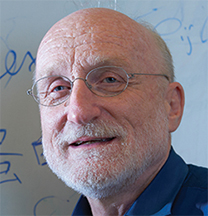Sander lauded for his efforts to bring science to all
Chris Sander, director of the cBio Center at the Dana–Farber Cancer Institute and a professor of cell biology at Harvard Medical School, is the 2018 recipient of the American Society for Biochemistry and Molecular Biology’s DeLano Award for Computational Biosciences.
Sander is recognized internationally in the field of computational and systems biology. He is credited with integrating computational sciences into biological research to make scientific resources easily accessible to the public. One example is the cBioPortal for Cancer Genomics, developed with colleagues Ethan Cerami and Nikolaus Schulz in his group during his time at the Memorial Sloan–Kettering Cancer Center. It is now an international open-source project containing cancer genomics data sets from published studies and data generated by The Cancer Genome Atlas and other sources.

“I subscribe to Warren DeLano’s mission statement: ‘Lack of access to effective software continues to be a major hindrance to scientific progress and therapeutic discovery. For the benefit of all society, we need to pursue new and complementary approaches to the creation and dissemination of scientific software.’ I am grateful we can make scientific software available to the world.”
— Chris SanderAs Joan Massagué, director of the Sloan–Kettering Institute and a leading scientist in cancer metastasis, pointed out in his nomination, Sander and his group have developed many online resources that unify scientists from different fields. Examples include the Dictionary of Secondary Structure of Proteins, co-developed with Wolfgang Kabsch at a Max Planck Institute and in widespread use for 35 years; the miRanda microRNA target prediction algorithm, with colleague Debora Marks; and the BioPAX and Pathway Commons resources for sharing biological pathway data, with former postdoctoral fellows Emek Demir and Gary Bader. In 2010, Sander and Marks developed Evfold, a method adapted from statistical physics that predicts protein 3-D structure folds from genetic sequences by analysis of evolutionary covariation patterns. Sander’s work “has contributed to key advancements in computational biology, structural biology, cancer genomics and cancer systems biology,” Massagué wrote.
Sander was trained in physics and mathematics at the University of Berlin, the University of California, Berkeley, and the Niels Bohr Institute in Denmark, and he earned his Ph.D. in theoretical physics from the State University of New York at Stony Brook. He founded the biocomputing program at the European Molecular Biology Laboratory and, with Michael Ashburner, co-founded the research section of the European Bioinformatics Institute. After working as scientific founder at a biotech startup, Millennium Information, he established the Department of Computational Biology at Memorial Sloan–Kettering.
Sander has co-authored more than 400 publications. He has a patent,“Models for combinatorial perturbations of living biological systems,” and has served on scientific advisory boards for organizations worldwide and helped shape many research programs. The International Society for Computational Biology awarded him its 2010 Accomplishment by a Senior Scientist Award.
The DeLano award recognizes the use of computational tools in biological research and providing public access to those tools. Sander is the ideal candidate, Massagué wrote in his nomination letter. Following the legacy of Warren DeLano, who advocated open-source practices in the sciences, Sander not only “built highly productive bridges between the computational and biological sciences through interdisciplinary and translational collaborations” but also “always ensured that resources developed by his team, as well as experimental data, are freely available to the public,” Massagué wrote.
Sander will receive his award during the 2018 ASBMB Annual Meeting in San Diego. His lecture, “Solutions to the computational protein folding problem,” will take place at 9 a.m. April 23 in Room 6B at the San Diego Convention Center.
Enjoy reading ASBMB Today?
Become a member to receive the print edition four times a year and the digital edition monthly.
Learn moreGet the latest from ASBMB Today
Enter your email address, and we’ll send you a weekly email with recent articles, interviews and more.
Latest in People
People highlights or most popular articles

Simcox wins SACNAS mentorship award
She was recognized for her sustained excellence in mentorship and was honored at SACNAS’ 2025 National Conference.

From humble beginnings to unlocking lysosomal secrets
Monther Abu–Remaileh will receive the ASBMB’s 2026 Walter A. Shaw Young Investigator Award in Lipid Research at the ASBMB Annual Meeting, March 7-10 in Washington, D.C.

Chemistry meets biology to thwart parasites
Margaret Phillips will receive the Alice and C. C. Wang Award in Molecular Parasitology at the ASBMB Annual Meeting, March 7-10 in Washington, D.C.

ASBMB announces 2026 JBC/Tabor awardees
The seven awardees are first authors of outstanding papers published in 2025 in the Journal of Biological Chemistry.

Decoding how bacteria flip host’s molecular switches
Kim Orth will receive the Earl and Thressa Stadtman Distinguished Scientists Award at the ASBMB Annual Meeting, March 7–10, just outside of Washington, D.C.

Thiam elected to EMBO
He was recognized during the EMBO Members’ Meeting in Heidelberg, Germany, in October.

